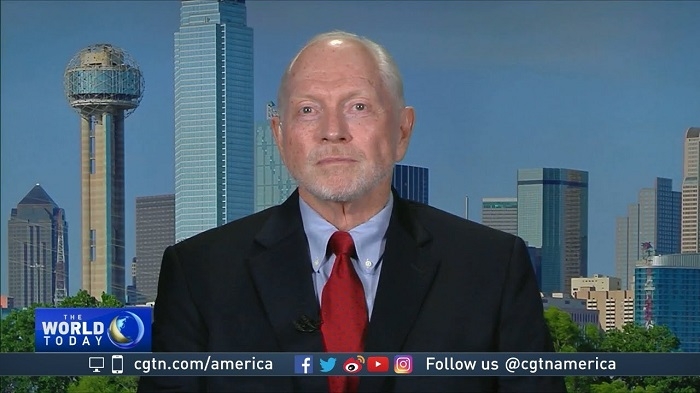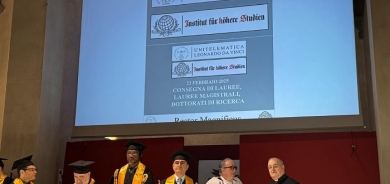Dr. Roby C. Barrett to Gulan: The current relationship between Russia and Iran is one of convenience

Dr. Roby C. Barrett is a fellow with the Middle East and North Africa Forum at Cambridge University specializing in Gulf and regional security issues. He is a former Foreign Service Officer with a background in intelligence and special operations. A graduate of the Foreign Service Institute’s intensive two-year Arab Language and Middle East Area Studies program, Dr. Barrett’s background includes the Counterterrorism Tactics and Special Operations training courses. In a written interview he answered our questions like the following:
Gulan: How do you anticipate the conflict between Russia and Ukraine to unfold? and why, in your opinion, is Russia stepping up its military endeavors? And how effective do you believe the sanctions imposed by the West are, given that Russia has plainly not run out of money?
Dr. Roby Barret: The only way to view the Russian invasion of the Ukraine is as an unmitigated disaster for Russia. Putin had an image of Russia that did not fit the reality on the ground and he made monstrous miscalculation. It is a disaster for the Ukraine as well but the Ukraine never had pretensions to being a superpower. No one – certainly not the US military – understood what a hollow shell the Russian military is. At this point, the only alternative that Russia has in the war is to throw thousands of bodies at the Ukrainians who have outfought them at almost every turn. The real damage to Russia is in the economic, social, and geopolitical arenas. Putin caused both Finland and Sweden to join NATO putting NATO on the doorstep of St. Petersburg and critical naval bases at Arkangel and Murmansk while giving the West far more global clout. The invasion undermined and reversed Western Europe’s growing dependence on Russian gas and oil. From an economic point of view, Russia today largely focused on the defense industry and other areas of the economy are collapsing but the real threat which even Putin grasps is demographic. The Russians have lost between 350,000 and 450,000 men of working and reproductive age. In addition, around 1 million skilled workers have fled the country because of the draft. Russia’s birthrate was already falling now it is collapsing along with the losses from the war, migration, and political uncertainty.
Russia is now economically isolated from the West. It is in the same condition as the Soviet Union meaning that the ability for the government to function is now totally dependent on price of oil. They will be able to survive as long as the price remains above $60 per barrel but should it fall as it has in the past then the economic isolation will create a serious crisis. In addition, the lack of access to Western technology and trade means that no matter what else happens Russia is falling further and further behind the West in development. Russia as a state will super power ambitions and views of itself has already suffered a severe strategic defeat. It is arguably now a vassal state to the China and dependent on Iran and North Korea for arms to defend itself. By any measure, it is a disaster brought about by a leader with a distorted view of reality, driven by a historical mirage surrounded by yes-men.
Gulan: What is your take away about Iran-Russia military cooperation, is it safe to call it a strategic alliance, or it is a mere marriage of convenience?
Dr. Roby Barret: Historically Russia has dominated Iran. Russia now needs Iranian weapons and support. The current relationship is one of convenience. Both see the West and the United States in particular as a threat and so they are cooperating. That does not change the fundamental conflict in interests between the two states. Now Iran is going through a very tough period following the death of Raisi. The instability could result in a miscalculation in which the aggravation posed by Iran and its policies in the Ukraine but mostly in the Middle East erupts in a war that sees Tehran and its allies – Hezbollah, HAMAS, Islamic Jihad, etc – further weakened. Should Iran get pulled into a major conflict it will end in disaster for the regime in Tehran.
Gulan: Do you think the Gaza War has any bearing on Russia and Ukraine, or is it irrelevant?
Dr. Roby Barret: It’s a distraction when the US needs to be focused on Russia and China but otherwise it tangential to the Ukraine situation.
Gulan: How do you characterize the current war in Gaza in terms of causes and consequences?
Dr. Roby Barret: There will be no winner in the sense that whether or not HAMAS loses its dominance in Gaza, the conflict between Israel and the Palestinians will continue. HAMAS cared nothing for the Palestinian people in Gaza – for them it was a political maneuver to get leverage over the Israelis. Iran supported at least in theory armed resistance because the diplomatic rapprochement between the Gulf States and Israel was a real threat to its interests in the Gulf. It has failed because it has only strengthened the hand of the Israeli hardliners. Remember that the arguments among the Israeli leaders are not about whether or not HAMAS in Gaza should be destroyed. The argument is about what comes after HAMAS control in Gaza is destroyed. This conflict has been going on since 1936 and the Great Palestinian Revolt against the British and Jewish emigration. It has been virtually continuous with short periods between the next conflict. That is not going to change. After October 7th Israeli support for a Palestinian State even among the liberal-left collapsed – it played into the hands of the Israeli right. Any agreement will be temporary and the broader conflict will continue.
Gulan: What USA should have and could have done differently to make the Middle East more peaceful and prosperous?
Dr. Roby Barret: The US government’s responsibility is to pursue its national interests. No matter what the US may want or how others may perceive “US responsibility” – the people of region are really the ones responsible for solving their own problems. We can help but at the bottom line – the fundamental conflicts are such that there really is no “Solution” with a capital S. Currently, any group that appears to be aligned with Iran is going to find itself in a difficult position vis-à-vis the US government no matter who is in power. From a US point of view, Iran is THE problem in the region and for US interests. If Iran or its allies create problems, then US sympathy for those caught in the middle is going to be less than it otherwise might be. Support for US allies is going to come first. Groups in region need to take a good look at what they are doing and what is possible and then act on that. October 7th did nothing to improve the situation of the Palestinian people – the frustration of the situation is understandable but in terms of the prospects for a future Palestinian state, it was a setback delivered by HAMAS and its Iranian backers. It was also a setback for Arab states that have been attempting to support efforts that might bring and improvement in the situation if not a solution.















